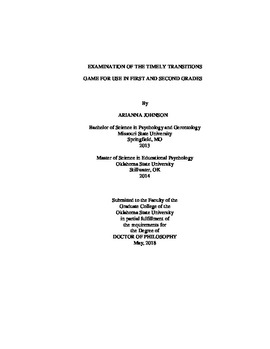| dc.contributor.advisor | Stinnett, Terry A. | |
| dc.contributor.author | Johnson, Arianna | |
| dc.date.accessioned | 2019-03-25T21:13:38Z | |
| dc.date.available | 2019-03-25T21:13:38Z | |
| dc.date.issued | 2018-05 | |
| dc.identifier.uri | https://hdl.handle.net/11244/317718 | |
| dc.description.abstract | As academic time and resources are ever shrinking it is important for researchers and practitioners alike to identify solutions that do not require many additional resources to yield big results. The Timely Transitions Game (TTG) offers a solution for teachers who find their classes spending precious learning time on inefficient transitions by integrating explicit timing procedures, an interdependent group-oriented contingency for reinforcement, and randomized success criteria. | |
| dc.description.abstract | The purpose of the current study is to validate the success of the timely transitions game in reducing the amount of time that it takes for classes of students to transition from recess to the school building while expanding the literature on group wide methods of decreasing transition time. | |
| dc.description.abstract | This study used a concurrent multiple baseline design to validate the effectiveness of the TTG on transitions of first and second graders from recess to the school building. Baseline data for three class' playground to building transitions were collected and recorded. Each class began playing the game as their individual baseline data stabilized or indicated an upward trend according to visual analysis. Initiation of game play was staggered by at least two days. If the class' transition time was less than their randomly chosen criteria they earned a letter toward their chosen reinforcement. For example, if working for cake they needed to earn C-A-K-E. Each class was given their reinforcement the day after they earned it. Results for two classes showed an immediate and stable decrease in the amount of time spent transitioning from the playground after recess to the school building. One class had data that were inconclusive but demonstrated an initial change in level during intervention phase. Their data returned to near baseline levels after they earned reinforcement. This study shows the promise for the positive effects of the TTG at decreasing the amount of time spent on transitions. | |
| dc.format | application/pdf | |
| dc.language | en_US | |
| dc.rights | Copyright is held by the author who has granted the Oklahoma State University Library the non-exclusive right to share this material in its institutional repository. Contact Digital Library Services at lib-dls@okstate.edu or 405-744-9161 for the permission policy on the use, reproduction or distribution of this material. | |
| dc.title | Examination of the timely transitions game for use in first and second grades | |
| dc.contributor.committeeMember | Duhon, Gary J. | |
| dc.contributor.committeeMember | Poncy, Brian C. | |
| dc.contributor.committeeMember | Davis, Charles Robert | |
| osu.filename | Johnson_okstate_0664D_15412.pdf | |
| osu.accesstype | Open Access | |
| dc.type.genre | Dissertation | |
| dc.type.material | Text | |
| thesis.degree.discipline | Educational Psychology | |
| thesis.degree.grantor | Oklahoma State University | |
